|
|
|
Sort Order |
|
|
|
Items / Page
|
|
|
|
|
|
|
| Srl | Item |
| 1 |
ID:
182054
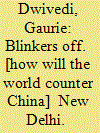

|
|
|
|
|
| Publication |
New Delhi, Pentagon Press, 2021.
|
| Description |
xii, 239p.hbk
|
| Standard Number |
9789390095414
|
|
|
|
|
|
|
|
|
|
|
|
Copies: C:1/I:0,R:0,Q:0
Circulation
| Accession# | Call# | Current Location | Status | Policy | Location |
| 060097 | 951/DWI 060097 | Main | On Shelf | General | |
|
|
|
|
| 2 |
ID:
155156
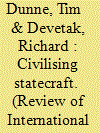

|
|
|
|
|
| Summary/Abstract |
In this contribution to the forum marking the publication of Andrew Linklater’s remarkable book on Violence and Civilization in the Western States-Systems we first locate the book in the context of Linklater’s overarching intellectual journey. While best known for his contribution to a critical international theory, it is through his engagement with Martin Wight’s comparative sociology of states-systems that Linklater found resonances with the work of process sociologist, Norbert Elias. Integrating Wight’s insights into the states-system with Elias’s insights into civilising processes, Violence and Civilization presents a high-level theoretical synthesis with the aim of historically tracing restraints on violence. The article identifies a tension between the cosmopolitan philosophical history which underpins the argument of the book, and which has underpinned all Linklater’s previous works, and the ‘Utrecht Enlightenment’ that offers a conception of ‘civilized statecraft’ at odds with a universal conception of morality and justice. The article then examines Linklater’s argument about the ‘global civilizing process’ as it applies to post-Second World War efforts to build greater institutional capability to protect peoples from harm. It is argued that Linklater over-estimates the extent to which solidarism has civilised international society, and that the extension of state responsibilities and development of civilised statecraft owe more to pluralism than solidarism.
|
|
|
|
|
|
|
|
|
|
|
|
|
|
|
|
| 3 |
ID:
166772
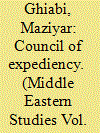

|
|
|
|
|
| Summary/Abstract |
Giorgio Agamben argues that in contemporary governance the use of ‘emergency’ is no longer provisional, but ‘constitutes a permanent technology of government’ and has produced the extrajudicial notion of crisis. The engendering of ‘zones of indistinction’ between the law and its practice is what Agamben defines as a ‘state of exception’. This article adopts the notion enunciated by Agamben and revisits it in the Islamic Republic of Iran. There, the category of crisis has been given, firstly, a juridical status through the institution of maslahat, ‘expediency’, interpreted in a secular encounter between Shica theological exegesis and modern statecraft. Secondly, crisis has not led to the production of a ‘state of exception’ as Agamben argues. Instead, since the late 1980s, a sui generis institution, the Expediency Council, has presided and decided over matters of crisis. Instead of leaving blind spots in the production of legislative power, the Expediency Council takes charge of those spheres of ambiguity where the ‘normal’ – and normative – means of the law would have otherwise failed to deliver. This is a first study of this peculiar institution, which invites further engagement with political phenomena through the deconstruction and theorization of crisis politics.
|
|
|
|
|
|
|
|
|
|
|
|
|
|
|
|
| 4 |
ID:
139830
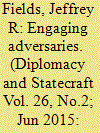

|
|
|
|
|
| Summary/Abstract |
American policy-makers and politicians present specious rationales for abjuring diplomatic engagement with adversarial regimes and actors. The conventional wisdom is that negotiating with adversaries is futile and a form of reward that the enemy will exploit. This tool of statecraft, therefore, should be avoided. However, many of the objections for avoiding diplomacy are suspect when examined closely. In addition, though prominent adversaries like Iran have generally shunned the United States, it has regularly engaged other hostile and adversarial regimes and non-state actors. The selective use of specious reasons contributes to an American foreign policy that often prefers the isolation and containment of ‘rogue states.’ Additionally, myths like the futility of appeasing adversaries have taken hold, and practitioners rarely question it. The post-Cold War American ‘diplomacy allergy’ is often counter-productive and stands in contrast to Cold War pragmatism.
|
|
|
|
|
|
|
|
|
|
|
|
|
|
|
|
| 5 |
ID:
163124
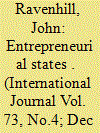

|
|
|
|
|
| Summary/Abstract |
The emergence of newly prominent participants (NPPs) in global governance has led to a revival of scholarly interest in the concept of middle powers. Because NPPs do not share the characteristics of “classical” middle powers, analysts have attempted to salvage the concept by adding various qualifiers. In doing so, they have further reduced its analytical utility. The concept of “entrepreneurial” states extracts the valuable components of the literature on middle powers while avoiding the problems arising from the conflation of two elements of behaviour—strategic and purposive. Entrepreneurial states are countries that seek to gain the support of others in pursuit of their perceived interests in the international system. They may be supporters of the current system, or seek to change it fundamentally. We investigate what attributes are necessary for states to behave in an entrepreneurial manner through studies of both successful and failed attempts at policy entrepreneurship.
|
|
|
|
|
|
|
|
|
|
|
|
|
|
|
|
| 6 |
ID:
155260
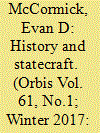

|
|
|
|
|
| Summary/Abstract |
“Those who consider the matter for a minute or two,” writes Philip Zelikow, a former official in the George W. Bush State Department and now professor of History at the University of Virginia, “realize that historical reasoning is as common in public affairs as oxygen is in water.” And yet, as the contributors to The Power of the Past agree, in institutional terms, the relationship between history and policy is “intimate but frequently dysfunctional.” The dysfunction is not for lack of awareness or trying. The craft of bringing historical knowledge to bear on contemporary policy problems has long been the aim of astute decision makers and has produced no shortage of corresponding academic volumes. Perhaps, the most notable of these—Ernest May and Richard Neustadt’s Thinking in Time: The Uses of History for Decisionmakers (1986)—is an explicit influence on the editors and contributors here.
|
|
|
|
|
|
|
|
|
|
|
|
|
|
|
|
| 7 |
ID:
150839
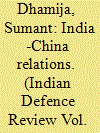

|
|
|
| 8 |
ID:
138231
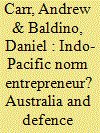

|
|
|
|
|
| Summary/Abstract |
The Indian Ocean is a region of increasing importance, with booming economic opportunities, shifting power dynamics and rising geopolitical competition. To manage this transition some Australian policy-makers are advocating the practice of defence diplomacy as a mechanism to help mould cooperative practices and to build regional trust while dissipating potential or ongoing regional flashpoints. Australia’s 2013 Defence White Paper identified Australia as an agent who can play a critical part in the emergence of certain types of norms as a means of conflict prevention and crisis management in the Indo-Pacific region. This paper explores the use of defence diplomacy as a means for seeking regional influence. It uses an innovative new framework of norm entrepreneurship to examine the choices facing Australian policymakers in increasingly complex security environment. This paper argues that while Australia should aim to promote defence diplomacy as a central part of rising security dialogue and practice with ‘like-mined’ countries, there must also be careful reflection to ensure that this objective is a constructive use of a middle power’s limited resources and influence.
|
|
|
|
|
|
|
|
|
|
|
|
|
|
|
|
| 9 |
ID:
192619
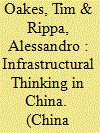

|
|
|
|
|
| Summary/Abstract |
Despite China's leading role in the construction of infrastructure over the past decades, the most influential paradigms for the study of infrastructure in the social sciences originate from research conducted elsewhere. This introduction to the special section “Chinese Infrastructure: Techno-politics, Materialities, Legacies” seeks to address this apparent gap, and contributes to building an innovative research agenda for an infrastructural approach in the China studies field. To do so, it pushes forward an understanding of infrastructure as both an empirically rich material object of research and an analytical strategy for framing research questions. We draw from two strands of inquiry: recent efforts to rethink the materiality of infrastructures not as an inert or stable basis upon which more dynamic social processes emerge, but rather as unstable assemblages of human and non-human agencies; and scholarship that explores the often hidden (techno-)political dimensions of infrastructures, through which certain intended and unintended outcomes emerge less from the realms of policy and implementation and more from the material dispositions and effects of infrastructural formations. These strands of inquiry are brought together as part of our effort to recognize that the infrastructural basis of China's approach to development and statecraft deserves a more concerted theorizing of infrastructure than we have seen thus far.
|
|
|
|
|
|
|
|
|
|
|
|
|
|
|
|
| 10 |
ID:
129674
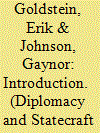

|
|
|
|
|
| Publication |
2014.
|
| Summary/Abstract |
This special issue of Diplomacy & Statecraft is in recognition of the contribution of Richard Langhorne to the fields of international history, diplomacy, and statecraft. He was a member of the founding Editorial Advisory Board of Diplomacy & Statecraft in 1988 and has served on that board for a quarter of a century, providing important guidance and notable contributions over many years. In his service to the scholarly world, beside his involvement with Diplomacy & Statecraft, Richard was one of the initial committee members of the British International History Group, of which he was the founding chairman and whose successful launch and in its early years he did much to ensure.
|
|
|
|
|
|
|
|
|
|
|
|
|
|
|
|
| 11 |
ID:
088347
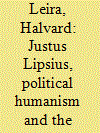

|
|
|
|
|
| Publication |
2009.
|
| Summary/Abstract |
Justus Lipsius (1547-1606) was among the most influential thinkers of the late 16th/early 17th centuries. His guides for action were highly influential in the establishment of moderate absolutism and what has been called the fiscal-military state across Europe. In this article I explore Lipsian thought in an International Relations context. Special attention is paid to his ideals of discipline, which were meant to order both the ruler and those that he ruled. Dignity, self-restraint and discipline were the recipes for the foreign policy of the prince, while the individual was subordinated to the purposes of the state, and taught to control his own life by mastering his emotions. If not a seminal thinker in his own right, it is necessary to understand Lipsius' thought and influence to be able to fully understand the 17th century theoretical approaches to peace and prosperity and the relative discipline of early-modern statecraft.
|
|
|
|
|
|
|
|
|
|
|
|
|
|
|
|
| 12 |
ID:
170502
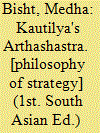

|
|
|
|
|
| Edition |
1st. South Asian Ed.
|
| Publication |
Oxon, Routedge, 2020.
|
| Description |
xiii, 187p.hbk
|
| Standard Number |
9780367479152
|
|
|
|
|
|
|
|
|
|
|
|
Copies: C:1/I:0,R:0,Q:0
Circulation
| Accession# | Call# | Current Location | Status | Policy | Location |
| 059821 | 320.0934/BIS 059821 | Main | On Shelf | General | |
|
|
|
|
| 13 |
ID:
188590


|
|
|
|
|
| Edition |
1st. South Asian Ed.
|
| Publication |
Oxon, Routedge, 2020.
|
| Description |
xiii, 187p.hbk
|
| Standard Number |
9780367479152
|
|
|
|
|
|
|
|
|
|
|
|
Copies: C:1/I:0,R:0,Q:0
Circulation
| Accession# | Call# | Current Location | Status | Policy | Location |
| 060269 | 320.0934/BIS 060269 | Main | On Shelf | General | |
|
|
|
|
| 14 |
ID:
192065
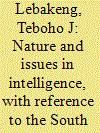

|
|
|
|
|
| Summary/Abstract |
In the realm of security, intelligence remains a critical component. This is because the role of intelligence in statecraft is crucial in providing intelligence information in the advancement of state, national and human security. When the intelligence service of a nation has fault-lines, this critical role can be severely hampered and undermined. However, given the nature of intelligence work any assessment of intelligence services and their role is bedevilled by several factors which makes it difficult even at the best of times for the public to appreciate it. Considering the above, the central question is: How do we make reasonable and grounded conclusions on the efficacy and effectiveness of the South African civilian intelligence service, the State Security Agency? In this article, an argument is advanced that given the current political environment in South Africa, peripheral factors such as ‘the politics around intelligence’ and ‘intelligence around politics’ have created a picture of dysfunction which is not grounded in reality. This analytical article is grounded in autoethnography given the positionality of the author as a former insider and also draws from primary and secondary desktop material. The theoretical underpinning/ungirding this work is institutional autonomy.
|
|
|
|
|
|
|
|
|
|
|
|
|
|
|
|
| 15 |
ID:
186101
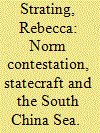

|
|
|
|
|
| Summary/Abstract |
Since 2009, the South China Sea disputes have taken on increasing global significance. Situated within a rapidly transforming political landscape, these sovereignty and maritime disputes are totemic of contests over the regional security order and the institutions, rules and laws that support it. The United States has explicitly called upon ‘like-minded’ allies and partners to defend the so-called ‘rules-based order’ against the revisionism of the rising People’s Republic of China, including in the maritime domain. In particular, the South China Sea has become a highly visible arena of ‘normative contestation’, one that raises questions about how norm-preservationist regional powers enact security practices to uphold their preferred vision of order. This study uses Australia as a regional power case study to assess the interests and approaches of a key US ally to normative contestation in the South China Sea. It addresses two questions: first, how does Australia perceive and articulate its interests in the South China Sea? Second, what security practices - diplomatic, legal and operational – can a regional power such as Australia bring to bear in its statecraft? It argues that as a regional power, Australia has adopted a normative approach to upholding maritime order. While Canberra has ratcheted up the rhetoric on the importance of maintaining the ‘rules-based order’ in response to China’s actions in the South China Sea, its security practices have retained a routine, ‘business-as-usual’ quality. This approach is designed to support maritime rules while avoiding economic retaliation from Beijing, reflecting broader strategic dilemmas as a middle-sized state wedged between two great powers. Unpacking the nuances of Australia’s South China Sea statecraft provides important insights for understanding for the preparedness and limitations of regional powers in defending their preferred conception of maritime order.
|
|
|
|
|
|
|
|
|
|
|
|
|
|
|
|
| 16 |
ID:
160949
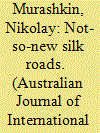

|
|
|
|
|
| Summary/Abstract |
Scholarly narratives concerning China's Belt and Road Initiative (BRI) tend to contextualise this project within China's rivalry with the United States and Japan. Such interpretations often reduce and misconstrue Japan's initiatives in Asian infrastructure finance as mere reactivity to China's advances. This paper will showcase Japan's own foreign and financial policies regarding infrastructure in Asia and the New Silk Road regions since the end of the Cold War. I argue that Japan's presence in that field is underappreciated and under-researched, as Japan's infrastructural footprint in the New Silk Road significantly pre-dates the BRI. Furthermore, I stress the fact that Japan's foreign policy in Asian infrastructure finance featured important cooperative postures toward China, especially within multilateral development banks. The paper makes a contribution to emerging scholarship on the BRI—often reliant on strategic communications and projections—by highlighting Japan's role in regional infrastructure to show how our understanding of international relations and international political economy in Asia can be better informed by economic history and area studies.
|
|
|
|
|
|
|
|
|
|
|
|
|
|
|
|
| 17 |
ID:
103174
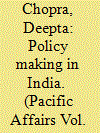

|
|
|
|
|
| Publication |
2011.
|
| Summary/Abstract |
This paper problematizes the concept of the state by studying its role and interactions with society in the realm of making policy. To achieve this, the case of a recently formulated social policy in India, the National Rural Employment Guarantee Act (NREGA), is examined. The paper provides empirical evidence of policy making as a complex and iterative process, which is mediated by a multiplicity of actors who operate in relation to each other. In tracing the formulation process of the NREGA, theoretical claims regarding the understanding of the state as an ideological construct as well as comprising of material practices are substantiated. The paper sees policy making as an act of governing, and contributes to ethnographic understandings of fuzzy and porous boundaries between the state and society that are redefined through the act of policy making. This dynamism, it is argued, results in the two-dimensional phenomenon of statecraft: how the state pursues policy making as a strategy for governing its population, and in turn, how the state itself gets reconstituted in the making of policy.
|
|
|
|
|
|
|
|
|
|
|
|
|
|
|
|
| 18 |
ID:
114959
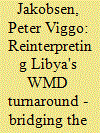

|
|
|
|
|
| Publication |
2012.
|
| Summary/Abstract |
The dominant explanations of Libya's nuclear reversal in 2003 privilege either coercion or carrots treating these instruments as alternatives. Indoing so they ignore that it took a combination of coercion, carrots and confidence-building to turn Libya around. This article demonstrates this by developing and deploying a theoretical framework that integrates these three instruments into a more coherent and convincing explanation of the case. It highlights that analysts and policy-makers would do well to focus more on how different policy tools can be used in combination to achieve desired outcomes than on how individual tools can be employed with decisive effects. It also demonstrates that the Libya success will be hard to replicate.
|
|
|
|
|
|
|
|
|
|
|
|
|
|
|
|
| 19 |
ID:
167203
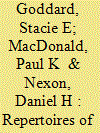

|
|
|
|
|
| Summary/Abstract |
Issues involving ‘statecraft’ lie at the heart of most major debates about world politics, yet scholars do not go far enough in analyzing how the processes of statecraft themselves can reshape the international system. We draw on the growing relational-processual literature in international relations theory to explore how different modes of statecraft can help create and refashion the structure of world politics. In particular, we argue that scholars should reconceive statecraft in terms of repertoires. An emphasis on repertoires sheds light on a number of issues, including how statecraft influences patterns of technological innovation, the construction of institutional and normative orders, and the pathways through which states mobilize power in world politics.
|
|
|
|
|
|
|
|
|
|
|
|
|
|
|
|
| 20 |
ID:
186887
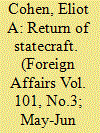

|
|
|
|
|
|
|
|